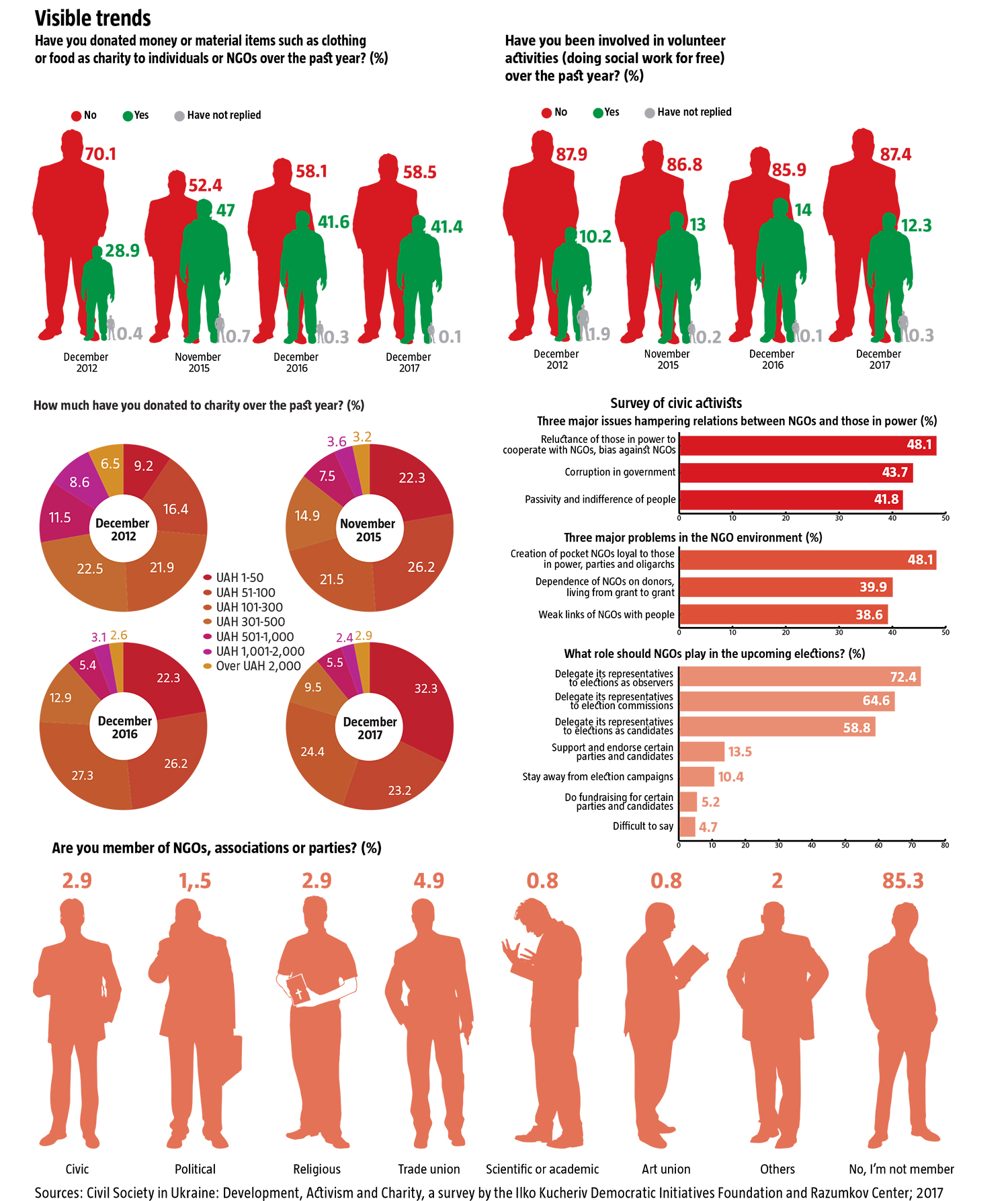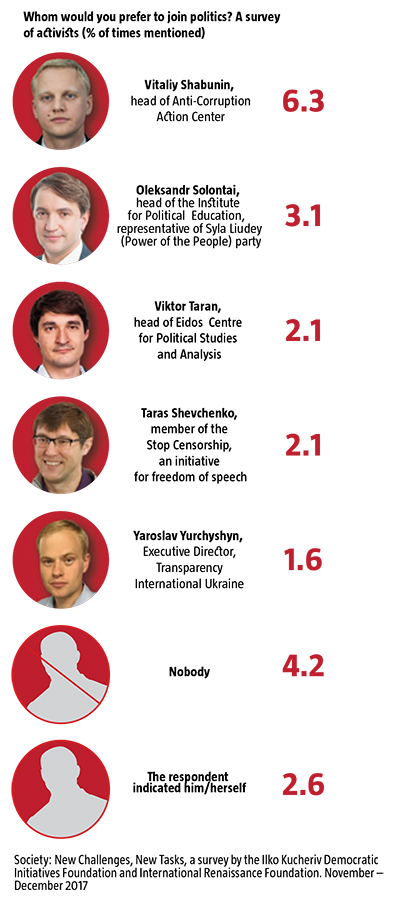Over the last four years, few politicians have been sparing with their compliments for active Ukrainians who are involved in social initiatives. At one time, President Poroshenko even had to apologise for his careless words about the role of volunteers in the first phase of the war against Russia. He stated that Ukraine could still be victorious without the contribution of volunteers. Following outrage in the media and on social networks, he said that without volunteers and the entire Ukrainian people, victory would be impossible. He apologised, although he noted that his words had been taken out of context. This was probably the only time when the president has apologised for his words or actions.
It has become a must for politicians to thank volunteers and express their gratitude to active citizens at the very least on Defender of the Fatherland Day and Ukrainian Army Day, as well as the anniversaries of protests and shootings on the Maidan. Now this is a part of the official ceremonies, equivalent to laying flowers in May at monuments to those who perished in the Second World War. Another trend is to emphasise the extraordinary self-organisation of citizens during the Maidan, which changed the mentality of Ukrainians forever.
RELATED ARTICLE: Who will influence the outcome of 2019 elections in Ukraine: poll analysis
Data from sociological surveys shows that Ukrainian society really appreciates the role of volunteers and civic organisations. In particular, volunteer organisations still maintain the best level of trust/distrust among citizens (+37%). Civic organisations also have a positive figure (+4%). The only two institutions in Ukraine that can boast the same results are the Church and the Armed Forces. The rest, including the media, are on the distrust side.
However, the impression that most of society has changed and is increasingly involved in making changes now, is mostly mistaken. A very small proportion of citizens actually participate in volunteering, civic or charity activities. According to the Ilko Kucheriv Democratic Initiatives Foundation, less than 7% of respondents stated that they were actively involved in civic activities over the past year and 87% said they were not.

The data was obtained during a December 2017 poll. Young people consider themselves somewhat more active. However, their difference from the older generation from the national average is almost invisible: only 10% of citizens aged 18-29 called themselves civically active.
When asked about the development of civil society in Ukraine, the respondents are quite critical. Only 10% of those polled said that this level was high or very high. About a third of them believe that it is average and over 45% said it was low or very low.
While there are often differences of opinion on politics and values between residents of different regions, views on civil society and its development are almost identical across Ukraine. However, there are some differences in the regional distribution of personal involvement in civic activities. The highest level is in the West (8.3%) and the lowest in the South (2.1%).
"If you compare the number of people involved in civic activities, it has not increased since 2012, despite the fact that civil society activity increased after the Revolution of Dignity. Social activists have simply doubled the time they spend doing work for the community, rather than involving more people," said Iryna Bekeshkina, director of the Democratic Initiatives Foundation, during a January round table in Odesa.
Is it possible to argue that impressions of large-scale changes in society have had little effect on the behaviour of citizens themselves? A partial answer to this question is given by the results of another DIF poll conducted more than a year ago. Then, the sociologists suggested that respondents give two answers to each question: one about society in general and one about themselves. The answer was that they observe changes in society but see them to a much lesser extent in themselves.
RELATED ARTICLE: What those in power and opposition are likely to do to improve their rates and mobilize the electorate
Sociologists received the following answers to the question "Has the willingness of citizens to join civic organisations and initiatives increased in the last two years (as of late 2015 – Ed.)?": more than 50% saw an increase in society's willingness to change,  but only 17.7% admitted similar changes in themselves.
but only 17.7% admitted similar changes in themselves.
Similarly, over 40% noticed an increase in other citizens’ concentration on civic activities and only 13% in themselves.
Sociologists recorded the same difference in perceptions of society and the respondents themselves for almost all questions in the civic activity block. In fact, the only exception was a question about increasing willingness to donate money to good causes. Here, a significant number of people have seen changes both in society (59.8%) and in themselves (41.1%).
Sociologists also focused on charity during a poll at the end of 2017. It revealed that this is the only type of civic activity that has undergone significant changes since the Maidan. In 2012, less than 30% of those polled had provided any sort of financial assistance to charity causes. In 2015, their number increased to 47%. In the past two years, the number of such people has decreased, but not by much: they still represent about 41%.
However, the structure of donations has also changed. In 2012, the majority were those who donated UAH 300-500 ($11-19) a year. They made up 22.5%. In 2017, people who donated from UAH 1 to 50 ($0.01-2) per year prevailed with 32.3%. The proportion of those who donate UAH 300-500 fell to 9.5%. This means that the number of people who give at least a few hundred hryvnias a year to charity remains almost unchanged.
Another study by Corestone Group and GfK Ukraine from early 2018 offers a better understanding of these figures. Although it showed a much larger number of philanthropists among citizens (about 70%), the general pattern matches the findings of other polls. On average, respondents make the largest yearly donations to help the army (UAH 466 – $17) and the smallest to alms and homeless people (over 70 UAH – $2.70). About half of the country's population prefers the second type of donation. Electronic transfers for charity are also unpopular: "As for the most convenient ways to make donations, 50% of those polled indicated that they preferred to give cash, 34% to donate things and 19% to leave cash in a box. Only 9% said it was convenient to make a transfer through the bank and 6% an online transfer,” the pollsters reported.
RELATED ARTICLE: The good, the bad and the ugly about emigration from Ukraine — and some surprising numbers
In other words, the increased readiness of individuals to give to charity in recent years was primarily due to street donations. So far, the main change after the Maidan is that people are willing to spend money on social initiatives and activities, but not their time. Citizens have an idea of a society that "has changed", but these changes have not yet reached the habits of its representatives.
In addition to a nationwide poll at the end of 2017, sociologists also interviewed the activists themselves. Representatives of 192 civic organisations took part in the study. They rate the development of civil society a bit higher than most citizens do. More than half (52.6%) consider it to be average, almost 29% low and less than 19% high.
The opinions of activists were divided as to the influence their organisations have on solving urgent problems. 49% consider this influence to be mostly or completely effective and 41% mostly or completely ineffective. Nevertheless, their assessment of the influence of civil society has changed significantly for the better in recent years. In 2013, only 8% of activists thought that civil society was sufficiently or quite influential – this number is now over 35%.
As far as active methods of influencing the government are concerned, activists mainly consider them to be interaction with the media (71%), the formation of associations between civic organisations (63%), appeals to the international community and global organisations (60%), public discussions on pressing social problems (58%) and delegating representatives of civic organisations to public office (54%).
In addition, activists have a generally positive attitude towards the aspirations of their colleagues to become politicians. They believe that in this way politics will improve in quality and their opportunities to have real influence on the situation in the country will grow. A significant number of them (almost 59%) expressed their readiness to delegate representatives as candidates for the upcoming presidential and parliamentary elections.
In addition, sociologists asked activists about the main problems in their field. The biggest one is the creation of puppet organisations by public authorities, political parties and oligarchs (48.1%). Other concerns include the dependence of organisations on donors (grantors) (39.9%), poor communication with the population (38.6%), lack of solidarity and conflict (28.5%) and a high level of ambition combined with inadequate qualifications, low knowledge and a reluctance to learn (27.2%)
Translated by Jonathan Reilly
Follow us at @OfficeWeek on Twitter and The Ukrainian Week on Facebook

